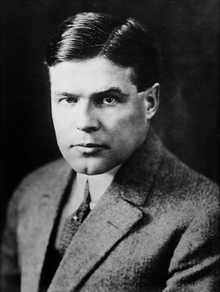Edward Wentworth Beatty
|
Sir Edward Beatty GBE KC |
|
|---|---|

Beatty circa 1918
|
|
| President of Canadian Pacific Railway | |
|
In office 1918–1943 |
|
| Preceded by | Lord Shaughnessy |
| Succeeded by | D'Alton Corry Coleman |
| Chancellor of Queen's University | |
|
In office 1919–1923 |
|
| Preceded by | James Douglas |
| Succeeded by | Sir Robert Laird Borden |
| 6th Chancellor of McGill University | |
|
In office 1920–1943 |
|
| Preceded by | Sir Robert Laird Borden |
| Succeeded by | Morris Watson Wilson |
| Personal details | |
| Born |
October 16, 1877 Thorold, Ontario |
| Died | March 23, 1943 (aged 65) Montreal, Quebec |
| Residence | Golden Square Mile |
| Alma mater | Osgoode Hall Law School |
Sir Edward Wentworth Beatty GBE KC (October 16, 1877 – March 23, 1943) was the first Canadian-born President of the Canadian Pacific Railway (1918–1943). He was responsible for building the Royal York Hotel and RMS Empress of Britain. He helped establish Canadian Pacific Air Lines. During World War II, he co-ordinated Canadian shipping and rail transport before ill health forced him to retire. He was Chancellor of Queen's University (1919–1923) and Chancellor of McGill University (1920–1943). A lifelong philanthropist, on his death he left half of his estate to charity. He left his home in the Golden Square Mile to McGill, which is today known as Chancellor Beatty Hall.
Born at Thorold, Ontario, he was the son of Henry Beatty (1834–1913) and Harriet Minerva Powell (1844–1916). Beatty's grandfather emigrated to Thorold from Ireland with his brother (a trained Land surveyor) in 1835, purchasing land on which they built a Grist mill, leather tannery and sawmill. By 1863, the Beattys had purchased the Parry Sound estate to add to the timber supplies needed for their enterprises at Thorold. In order to ship the timber between their two properties they established the Georgian Bay Transit Company, which Henry Beatty took control of in 1865, and transformed it into the Beatty Line of Steamships which later expanded to operate on the Great Lakes. Henry Beatty was described as "a man of unusual executive ability and vision", qualities that his son, Edward, inherited in no small dose.
...
Wikipedia
